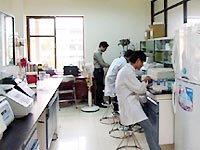This is one of 17 key laboratories nationwide that have been completed with state investment. The laboratory was inaugurated this morning at the Institute of Biotechnology in Hanoi.
 |
| Key Gene Technology Laboratory (Photo: VNE) |
The construction of the key gene technology laboratory began in 2001 and will be a venue for conducting research and projects related to the establishment of gene banks and maps, participating in domestic and international genetic disease research programs, and contributing to the development of bioinformatics. This facility will also serve as a training ground for master’s and doctoral students in the field of biotechnology. The laboratory will always welcome individuals and university students for research or thesis work.
The laboratory is equipped with over 130 main machines and more than 700 pieces of equipment, along with 200 types of accessories. All of this equipment belongs to the most advanced generation and is making its debut in Vietnam. The system is divided into three clusters to serve research in genomics, proteomics, and bioinformatics. To train a workforce for the laboratory, the Institute has produced 3 PhDs and 13 master’s graduates.
Mr. Le Tran Binh, the director of the Institute of Biotechnology, stated that since the laboratory’s key equipment has been in use, the Institute has undertaken numerous projects at the state and ministerial levels, as well as international projects. Among these, three notable projects have had significant impact. These include a project applying DNA techniques in the identification of fallen soldiers’ remains, a project developing detection techniques and a production process for vaccines against the A/H5N1 virus for poultry and humans, and a study on the effects of Agent Orange.
Thanks to its modern equipment, the Institute has identified over 100 sets of remains of fallen soldiers and accurately named 47 previously unidentified soldiers. The Institute also actively participated in the identification and decoding of the A/H5N1 virus gene during the outbreak in 2003-2004. Furthermore, it successfully developed a vaccine production technology process based on an international vaccine strain against the A/H5N1 virus.
Speaking at the inauguration ceremony, Mr. Tran Quoc Thang, Deputy Minister of Science and Technology, remarked: “The successful establishment of the key gene technology laboratory is the result of highly effective management alongside a dynamic, creative, and highly skilled team.”
Mr. Thang expressed that with facilities on par with the region, the Institute must enhance its missions to match regional standards. In addition to receiving projects from the government, the Institute can also propose and design research that leverages the strengths of the key laboratory while being tailored to Vietnam’s specific needs.
Anh Thi



















































